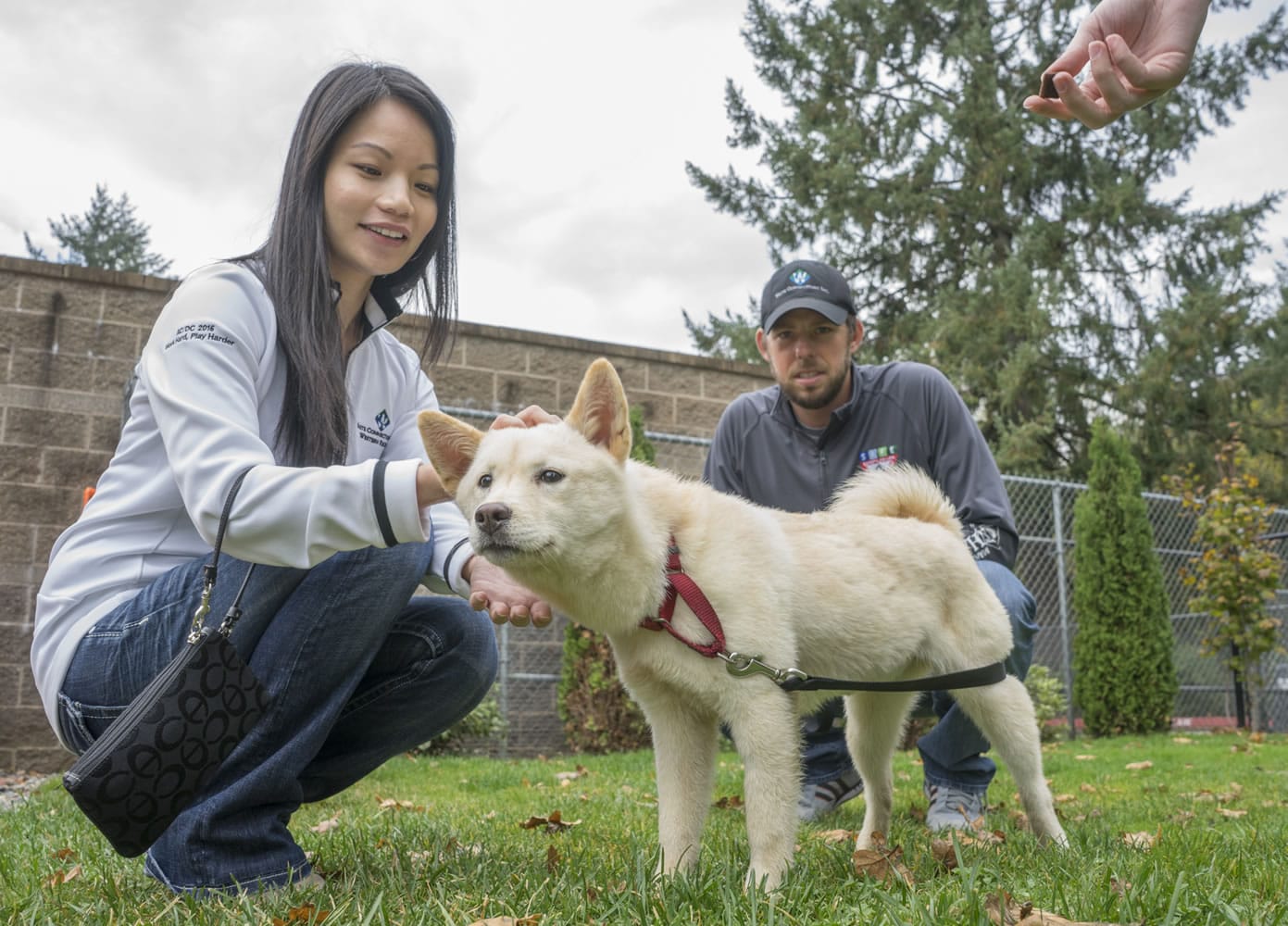The small, cream-colored Jindo pulled on the leash, hesitant to walk down the hallway and out the door toward the unknown. All the 5-month-old puppy had ever known was her kennel at the Humane Society for Southwest Washington, the shelter’s fenced yard and before that, a Korean dog meat farm.
Eventually, adoptions counselor Shayla Saldano scooped up the pup to bathe her before handing her off to her new family. Seoul — named after South Korea’s capital city — is the first of 25 dogs at the shelter to get adopted after being rescued from South Korea in August.
On Saturday, Autumn and Jeff, who asked that their last names not be used, got instructions on how to care for their new family member.
“Just remember, everything is going to be new to her,” said Mary Clayton, adoption supervisor.
Dog ownership is new for Autumn, who’s been wanting a canine running companion.
“I had that gut feeling that she would be the perfect first dog,” she said.
“She went in and said, ‘I want that one,’ ” Jeff said. “It was pretty fast.”
Jeff, who works at Waste Connections, heard about the Korean rescue dogs during the Humane Society’s annual auction. After meeting Seoul and realizing the challenge they would be taking on, the Vancouver couple thoroughly researched the breed before making their decision.
The Jindo, which looks similar to the Shiba Inu or Akita, is known for being particularly protective, intelligent, easy to house train and a thorough self-groomer. Autumn works three days a week, giving her time to oversee Seoul’s health and development.
“We’ve been dog shopping the last two days,” she said. They picked out all the necessities, along with Huskies and Seahawks jerseys for the dog.
Autumn recently bought a new car, a small SUV, with dog ownership in mind. Seoul eagerly accepted affection as she was coaxed into the back of the SUV. She used to not let anybody touch her.
Staff and volunteers at the Humane Society were assigned to work with the Korean dogs. In the beginning, they would just sit in the dogs’ kennels, getting them used to human presence. Then, as the dogs got used to being at the shelter and wearing a collar, they began trying to get the dogs to walk on leashes. One person would hold the leash while another person would coax the dog forward with a treat or a spatula of soft food.
What would be a 15-minute walk for other dogs at the shelter turned into an hourlong excursion for the Korean dogs. They had to sniff, examine and taste everything. Doors, hallways, dirt — it was all new — and the learning process was slow and deliberate. Humane Society president Stacey Graham remembers observing a couple of the dogs while they played in the fenced-off yard area. A strong wind blew, sending leaves from nearby trees swirling through the air. The dogs froze, uncertain what the leaves were all about. As soon as they discovered that the leaves were just, well, leaves, the pups began romping through the fallen foliage.
“We’re not going to let them go until they’re ready,” Saldano said.
As part of the adoption package, the shelter is covering phone consultations and beginning obedience classes. Each dog comes with a care package full of toys — to help prevent furniture from getting destroyed — food and a crate to help with house training. Clayton reminded Jeff and Autumn to keep Seoul on a leash outside, so she learns how to behave on a leash.
“We want the very best outcome for this. We don’t want the dogs to have to come back,” Graham said.
All the dogs were spayed, neutered and microchipped, like any other dog that comes through the shelter. One of the dogs underwent surgery to repair soft tissue damaged near its rear. Another dog has an injured jaw and sagging teats as a result of being used for breeding.
Besides a handful of small-breed Jindo mixes, the Humane Society received 20 Japanese mastiffs, also called Tosas, which weigh 80 to 130 pounds.
“They’re just so goofy. They’re kind of like great big puppies,” Graham said.
In total, Humane Society International rescued 103 dogs from the Korean meat farm and transferred them to shelters across the United States. The agency aims to end the dog meat trade and transition farmers to other ways of making a living.
There are more than 17,000 dog farms across the country, breeding more than 2 million dogs a year for consumption, according to South Korea’s Ministry of the Environment. The meat is considered a delicacy. The dogs lived in small, crowded cages outdoors with little human contact.
The Humane Society for Southwest Washington expects all 25 of their dogs will be adopted over the next couple of months. Twenty-three people have applied to adopt a dog so far.
By the end of the year, the shelter will have taken in about 1,200 dogs. Although there’s locally an overabundance of cats and kittens, there aren’t enough local dogs to fill the demand for companions. So, the shelter takes in dogs from other states, including California, Hawaii and Texas, and occasionally other countries.





